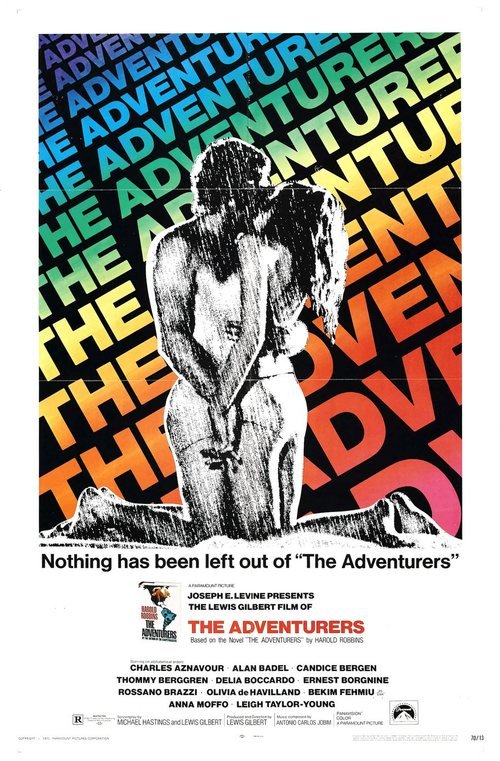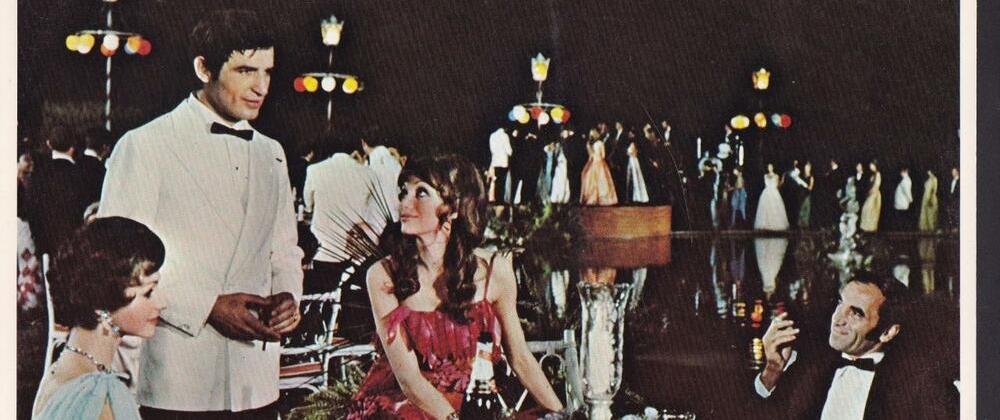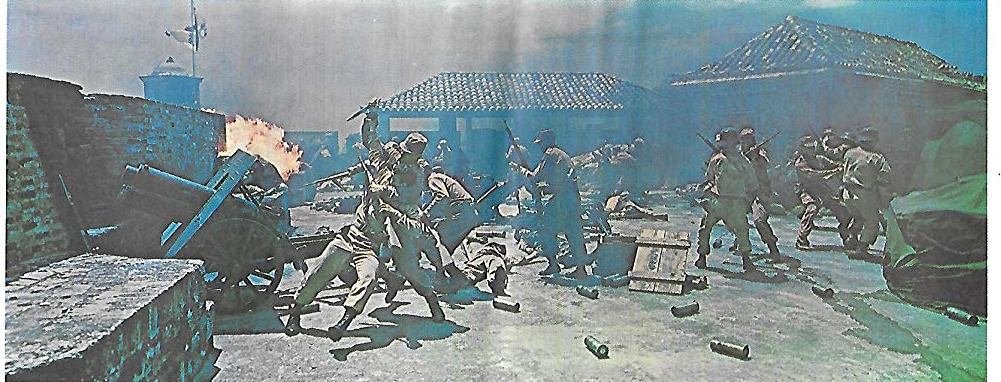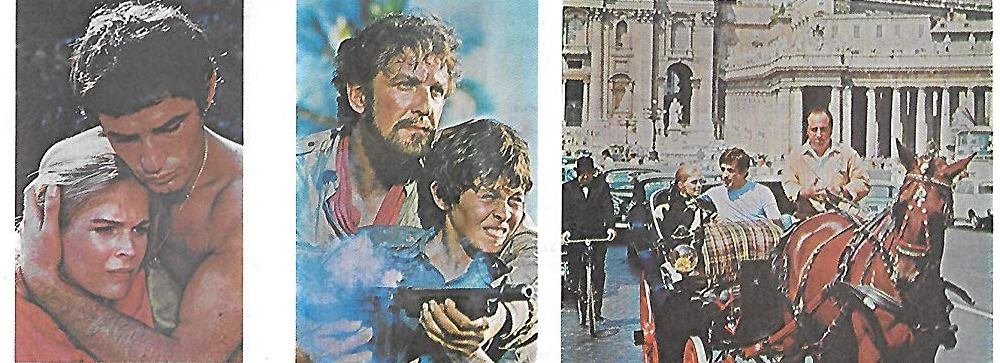THE ADVENTURERS (1970): Continental Sleaze And Soap, The Robbins Way
In the '60s and '70s, your best value for sleaze entertainment on a grand scale was at the bookstore. Books could deliver epic, lavish narratives packed with sex, sleaze and cheap thrills that movies and television couldn't compete with. Critics and highbrow authors sneered at this trend but there were an array of authors who dished up 24-carat sordid melodramas for the masses: Jacqueline Susann, Sidney Sheldon, Jackie Collins, etc.That said, the king of this arena had to be Harold Robbins. He was prolific as he was unafraid of breaking taste-related taboos and he dominated coffee tables and nightstands around the world with a string of oversexed, gleefully lurid books that mixed sudsy soap opera and subtle-as-a-flying-mallet plot twists with a dash of ripped-from-the-headlines real life scandal. He never got good reviews in the book columns but his trashy tales sold in the hundreds of millions all over the world. Of course, such strong and consistent success demands attention from Hollywood and they were quick to adapt the Robbins ouevre for film and television purposes. On the big screen this produced hits (The Carpetbaggers) as well as duds (The Lonely Lady). The Adventurers lands somewhere in the middle of Robbins adaptations in terms of success: it made decent profits despite critical apathy but was too costly to overcome its lavish budget. That said, it remains impressive for fans of camp classics because it faithfully translates the Robbins style to the big screen, lurid glamour and all.The Adventurers tells the tale of one Dax Xenos (Bekim Fehmiu). Born in the fictional South American country of Courteguay, he loses his mother and sister to state-sponsored violence in the revolution. He and his father Jaime (Fernando Rey) survive and are shipped off to Europe as Jaime becomes a diplomat. However, when Jaime is betrayed by revolutionary-turned-corrupt-leader Rojo (Alan Badel), Dax is forced to start from scratch with the help of family friend Fat Cat (Ernest Borgnine).Dax vows revenge on Rojo and becomes a gigolo to rebuild his fortunes, romancing everyone from a diplomat's wife (Olivia De Haviland) to a wealthy heiress Sue Ann Daley (Candace Bergen). What follows is an array of betrayals, alliances, money, guns and plenty of sex.
Of course, such strong and consistent success demands attention from Hollywood and they were quick to adapt the Robbins ouevre for film and television purposes. On the big screen this produced hits (The Carpetbaggers) as well as duds (The Lonely Lady). The Adventurers lands somewhere in the middle of Robbins adaptations in terms of success: it made decent profits despite critical apathy but was too costly to overcome its lavish budget. That said, it remains impressive for fans of camp classics because it faithfully translates the Robbins style to the big screen, lurid glamour and all.The Adventurers tells the tale of one Dax Xenos (Bekim Fehmiu). Born in the fictional South American country of Courteguay, he loses his mother and sister to state-sponsored violence in the revolution. He and his father Jaime (Fernando Rey) survive and are shipped off to Europe as Jaime becomes a diplomat. However, when Jaime is betrayed by revolutionary-turned-corrupt-leader Rojo (Alan Badel), Dax is forced to start from scratch with the help of family friend Fat Cat (Ernest Borgnine).Dax vows revenge on Rojo and becomes a gigolo to rebuild his fortunes, romancing everyone from a diplomat's wife (Olivia De Haviland) to a wealthy heiress Sue Ann Daley (Candace Bergen). What follows is an array of betrayals, alliances, money, guns and plenty of sex. The resulting film captures a genuine Robbins feel, delivering lurid subject matter presented without any concessions to good taste and doing so on an epic, lavishly budgeted scale. The script is hopelessly campy and hamhanded in its total lack of subtlety ( a scene of domestic tragedy for Dax and Sue Ann is laugh-out-loud material that must be seen to be disbelieved). That said, these aspects of the film feel oddly appropriate for the subject matter and the narrative actually does a decent job of compressing novelistic sprawl to fit the needs of a three-hour epic film.That epic feel is carried over to the direction of Lewis Gilbert, a British journeyman best known to film fans for work on three Bond films. Producer Joseph Levine was one of the last big moguls of his era and he gives Gilbert an A-team of professionals to give The Adventurers epic levels of gloss and craft. Notable names on the above-the-line team include Lawrence Of Arabia editor Anne V. Coates, top French cinematographer Claude Renoir and master bossa nova auteur Antonio Carlos Jobim to do the score.It's worth noting that Gilbert was fresh off of making You Only Live Twice and the skill for capturing big action and globe-trotting narratives shown in that film serves him well here. With the help of second unit director Ernest Day and stunt coordinator Bob Simmons, Gilbert creates some epic battles worthy of any war movie you care to mention. Highlights in this area include a fiery nighttime siege on a revolutionary village and a jawdropping moment where rebels on horseback take out not one but two airliners loaded with explosives.
The resulting film captures a genuine Robbins feel, delivering lurid subject matter presented without any concessions to good taste and doing so on an epic, lavishly budgeted scale. The script is hopelessly campy and hamhanded in its total lack of subtlety ( a scene of domestic tragedy for Dax and Sue Ann is laugh-out-loud material that must be seen to be disbelieved). That said, these aspects of the film feel oddly appropriate for the subject matter and the narrative actually does a decent job of compressing novelistic sprawl to fit the needs of a three-hour epic film.That epic feel is carried over to the direction of Lewis Gilbert, a British journeyman best known to film fans for work on three Bond films. Producer Joseph Levine was one of the last big moguls of his era and he gives Gilbert an A-team of professionals to give The Adventurers epic levels of gloss and craft. Notable names on the above-the-line team include Lawrence Of Arabia editor Anne V. Coates, top French cinematographer Claude Renoir and master bossa nova auteur Antonio Carlos Jobim to do the score.It's worth noting that Gilbert was fresh off of making You Only Live Twice and the skill for capturing big action and globe-trotting narratives shown in that film serves him well here. With the help of second unit director Ernest Day and stunt coordinator Bob Simmons, Gilbert creates some epic battles worthy of any war movie you care to mention. Highlights in this area include a fiery nighttime siege on a revolutionary village and a jawdropping moment where rebels on horseback take out not one but two airliners loaded with explosives. Gilbert disavowed the film in later years but his work here suggests he knows exactly what he was making. Of particular note are the love scenes, which use florid techniques to cover for their lack of explicitness: a poolside rendezvous includes cutaways to leering cherub statues, zoom lens abuse and a cheap psychological-motivation flashback to explain kink while a seduction in a greenhouse is staged at night with fireworks exploding overhead!Finally, The Adventurers is notable for its quirky international cast. Eastern European actor Fehmiu was an unknown to U.S. audiences but he's pretty convincing as he brings to life the film's arch concept of a hero who as defined by his ruthlessness and cool temper as he is his style. On the camp side, Borgnine is delightful hamming it up as a loyal bandito, Bergen goes all-out for the film's melodramatic romance angle and Badel is a hoot as an oddly foppish revolutionary leader (it's worth noting this a movie where none of the cast strives for plausible foreign accents). The one surprise here in terms of performance is De Havilland, who delivers an unexpectedly sincere and affecting portrait of a middle-aged woman of means in need of romance.
Gilbert disavowed the film in later years but his work here suggests he knows exactly what he was making. Of particular note are the love scenes, which use florid techniques to cover for their lack of explicitness: a poolside rendezvous includes cutaways to leering cherub statues, zoom lens abuse and a cheap psychological-motivation flashback to explain kink while a seduction in a greenhouse is staged at night with fireworks exploding overhead!Finally, The Adventurers is notable for its quirky international cast. Eastern European actor Fehmiu was an unknown to U.S. audiences but he's pretty convincing as he brings to life the film's arch concept of a hero who as defined by his ruthlessness and cool temper as he is his style. On the camp side, Borgnine is delightful hamming it up as a loyal bandito, Bergen goes all-out for the film's melodramatic romance angle and Badel is a hoot as an oddly foppish revolutionary leader (it's worth noting this a movie where none of the cast strives for plausible foreign accents). The one surprise here in terms of performance is De Havilland, who delivers an unexpectedly sincere and affecting portrait of a middle-aged woman of means in need of romance. In short, The Adventurers is a deluxe campfest worthy of consideration alongside Valley Of The Dolls because it delivers all the oversexed melodrama you'd expect plus action on the scale of a Bond flick and the kind of cynical take on politics that is perfect for an early '70s film. It's rare to see a film this knowingly trashy made on such a grandiose scale and it thus perfectly conveys the vibe of a Harold Robbins pop-paperback blockbuster.
In short, The Adventurers is a deluxe campfest worthy of consideration alongside Valley Of The Dolls because it delivers all the oversexed melodrama you'd expect plus action on the scale of a Bond flick and the kind of cynical take on politics that is perfect for an early '70s film. It's rare to see a film this knowingly trashy made on such a grandiose scale and it thus perfectly conveys the vibe of a Harold Robbins pop-paperback blockbuster.

